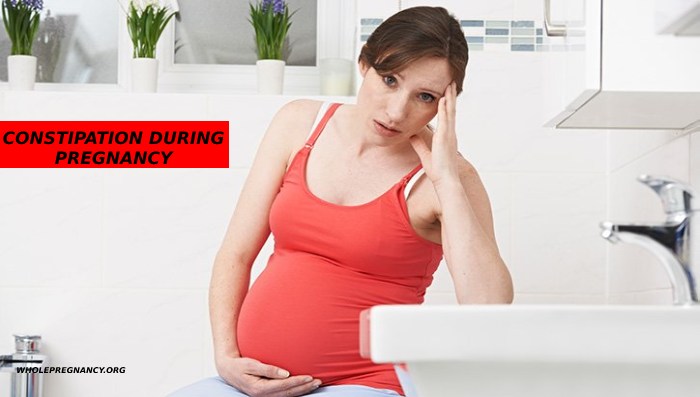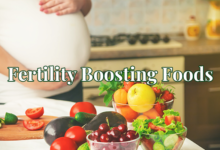Constipation During Pregnancy

Constipation during pregnancy is a common thing among pregnant women. According to a study published by Acta Obstetricia et Gynologica Scandinavica, almost three quarters of all pregnant women will experience constipation or other bowel problems at some time.
What is constipation?
Although a person’s ‘normal’ bowel function may vary from one person to another, some people have difficulty passing soft stool (poo) on a regular basis. Constipation is when you have stools that are difficult to pass and bowel movements less than three times per week.
Constipation can make it difficult or painful for you to pass your stool. You may need to push or strain. Constipated people may feel that they have not completely empty their bowels, and feel the need to pass more stool even after they have passed stools. Constipation can occur in as many as 14% of pregnant women. In most cases, as your pregnancy progresses your constipation will disappear.
What causes constipation during pregnancy?
Constipation can occur during pregnancy when there is a low intake of dietary fiber. Constipation can be more common in pregnancy, but there are reasons for it. A higher level of progesterone, the pregnancy hormone, can make your gut work less efficiently and cause food to travel slower through your intestines. This is called reduced gastric motility.
Constipation can also be caused by medications and other supplements taken during pregnancy. Some women may experience constipation from medicines that are prescribed for nausea, vomiting, or antacids to treat heartburn. Parental supplements such as iron and calcium can also cause constipation. Talk to your doctor if you are experiencing constipation after taking any of these medications during pregnancy. Sometimes, a simple change in the brand or dosage can help reduce constipation. Everyone is different, so a formula that causes constipation in one person may work for another.
Am I more likely to have constipation if it has happened before I became pregnant?
Unfortunately, women who had constipation prior to pregnancy are more likely to have worsening symptoms during pregnancy. If you are considering to get pregnant and have constipation, you should try to adopt good habits. Regular exercise and a healthy eating will help to maintain regular bowel movements. It’s better to prevent constipation earlier than to wait for it to get worse.
What is the best way to treat constipation during pregnancy?
Increase the amount of fluids and fiber in your diet is the first step to treating constipation. Having a diet full of wholegrains, fruits and vegetables can help you resolve your constipation issues. In addition you can use fibre supplements and laxatives to temporarily relieve constipation if symptoms persist.
However, it is better to stimulate the bowel using a healthy diet than taking medications. Side effects of laxatives include diarrhoea and abdominal pain. There are many ways to avoid nine months of discomfort. There are many ways to fight colon congestion, as well as avoid hemorhoids (a common side effect from constipation).
Fibers rich foods is the best way to fight constipation during pregnancy.
Consume 25 to 35 grams of fiber each day. You can read the labels, but it’s not necessary to do the math. Focus instead on eating whole grains, breads, legumes (edamame, chickpeas), fresh fruits, vegetables (raw or lightly fried — preferable with the skin still on), and dried fruit. You can also go for the green, both in the form of leafy green veggies and kiwi fruits, which have a powerful laxative effect.
Take a look at this delicious and fiber-rich menu for some inspiration. Are you really plugged up? You might consider adding bran or psyllium into your diet. Start with a small amount and increase as you need. You should always consult your doctor before adding bran or psyllium to your diet. These fiber powerhouses can rob important nutrients from the body before they can be absorbed. Flatulence is a common side effect of increasing fiber intake.
Refrain from refined.
Refrain from refined grains such as white bread, white rice and refined cereals. They tend to be backwards.
Get up.
Consuming between eight to 10 8-ounce glasses (water, vegetable juice, or broth) daily keeps solids moving through the digestive tract. This makes stool easier to pass and softens it. Use warm liquids such as hot water and lemon to stimulate peristalsis, which is the intestinal contractions that aid you to go. Because it is mildly laxative, prune juice is an excellent choice for really difficult cases.
Do not overeat at mealtimes.
Don’t eat too many large meals, because this can cause your digestive system to become clogged up and end up by suffering from digestive disorders. You might feel less gas and bloating if you eat six small meals per day, rather than three large meals.
You have to go when you need to.
Constipation can result from holding the stool in your bowels for too long. So when ever you feel like you need to go to toilet, go, don’t hold it because it is going to hurt.
Take into consideration your medications and supplements.
Many of the medications and supplements that are good for pregnant women (prenatal vitamins and iron supplements, as well as antacids and calcium) can cause constipation. Talk to your doctor about possible alternatives, such as slow release iron supplements or adjustments in dosages until your situation improves. Also ask your doctor about magnesium supplements to combat constipation. It may help relax your muscles and improve your sleep quality by being taken at night.
Get your daily dose of probiotics.
Yogurts containing active cultures contain probiotic acidophilus. This stimulates the intestinal bacteria to better break down food and keep things moving. Ask your doctor to recommend a good probiotic supplement that you can add to smoothies in the form of capsules, chewables, or powder.
Get up and start moving.
Regular exercise during pregnancy encourages regular bowel movements. Even just a 10-minute walk can get things moving, so make sure you’re getting the recommended amount of practitioner-approved exercise.
Avoid stimulant laxatives.
Before you take any constipation medication, consult your doctor.
Keep your Kegels in order.
Exercise when you are constipated. Your pelvic floor muscles can become weaker, but regular ketogels can help keep them stronger.
Discuss your concerns about constipation during pregnancy with your doctor.
Tell your provider if you are having trouble getting things moving. Her doctor may suggest over-the-counter medications like polyethylene glycol or docusate.
Could this be an indication of something more serious?
Although constipation is not usually a sign or symptom of illness, there may be complications like hemorhoids and faecal impurity. Rarely, more serious conditions like tumours can cause constipation. Talk to your doctor immediately if you have any concerns, especially if there is blood in your stool.
What will it do to my baby’s health?
Constipation is not something you should worry about if you are pregnant. The discomfort is caused by the mother’s bowel and stomach and isn’t passed on to her baby. While most laxatives don’t get well absorbed into bloodstreams, they can be used during pregnancy and breastfeed. However, it is important to consult your pharmacist before you take any medicine while pregnant.
What will happen to it after the baby is born?
Constipation can continue after birth for a variety of reasons. After a caesarean, women who have experienced constipation may experience it for several days before their regular bowel movements resume. After a vaginal delivery, women who have stitches may feel hesitant to use the toilet, this can lead to a buildup of bowel problems.
Constipation can also occur if you have taken strong pain medication since having your baby. Mothers who are new to motherhood often have a lot more to do than normal during the first few weeks or months. Although it may seem that taking care of your own health has been less of a priority during pregnancy, your health is still just as important. To promote healthy bowel movements, breastfeeding should eat lots of fiber-rich fruits, vegetables, wholegrains, and fluid intake.




